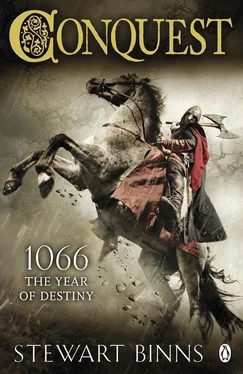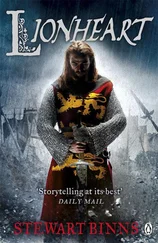Hereward questioned the messenger further. ‘What of William and his army, will they return to Winchester?’
‘No, sir. The Duke has sent to Winchester for his crown and regalia. He is to celebrate his Christmas crown-wearing at York in his new motte and bailey.’
‘Yes – and, at the same time, keep an eye on the Danes of course!’ Hereward observed. He was becoming hardened to misfortune and reversals.
This time, Prince Edgar was the first to ask what their new plan would be.
Hereward was succinct in his reply. ‘It will soon be October. The Danes will not fight, but will sit on their ill-gotten gains and grow fat in their winter camp. William will light fires and eat Yorkshire’s game in his Great Hall and parade around in his crown, thinking he is Charlemagne. As for us, we must lie low once more. Don’t go to Malcolm – I don’t trust him not to be seduced by William’s riches and hand you over to the Normans. Go north, high into the Pennines, and make a secure winter camp there. Wait for news from me; we will launch a new campaign in the spring.’
‘Do you still have the heart for this, my brave Hereward?’
‘As long as the Normans plunder this land, I have the heart for it.’
The Prince thanked Hereward warmly, while Einar gave Edgar advice about where he should go.
‘My Lord, go to the head of the valley of the Swale; no one will find you there. There is some good pasture, and the valley is deep and will protect you from the winter gales. I know the area well. We can reach you from our camp without having to leave the sanctuary of the Pennines. There is an old housecarl who lives in the Swale. His name is Osulf – I served with him for Aelfgar, Earl of Northumbria. He will be invaluable to you. Winters can be very hard there.’
‘Thank you, Einar. What will you do, Hereward?’
‘We will return to our base on Clitheroe Hill for the winter. It is better if our forces are spread far and wide; it will keep William guessing. I will send for news of Eadric in Mercia, and of the forces of Godwin Haroldson in the South West, and pass it on to you.’
‘Be careful, my good and loyal friend.’
‘I will, my Prince. God’s speed to your safe haven.’
Edgar’s force rode off at a gallop. He took many good men with him, including Waltheof and Siward Bjorn.
Hereward wondered if he would ever see any of them again.
Within a few hours of the Atheling’s departure, Hereward had made a decision.
‘Einar, lead the men back across the Pennines to Clitheroe Hill. Edwin, Edmund and I are going to see a Danish prince.’
The Danish camp at Axholme was a flurry of activity. A significant wooden palisade was being built on what was, in effect, an island. The ground was being cleared for wooden barracks and a massive centre post was being driven into the ground for Prince Osbjorn’s Great Hall.
The Englishmen were given a warm welcome. Osbjorn was tall, but lacking the heavy build of a typical Danish warrior, and more resembled a diplomat or a cleric. Paradoxically, the cleric standing to Osbjorn’s right – Christian, the Bishop of Aarhus – had both the build and demeanour of a housecarl. Harold and Cnut, King Svein’s sons, were imposing men who looked more than capable of leading an army into battle. Osbjorn introduced several senior Danish nobles and magnates from Poland, Saxony and Lithuania, all of whom would be taking home significant shares of the bounty from William’s treasury.
‘Prince Osbjorn, thank you for seeing us. I am Hereward of Bourne, commander of the forces of Edgar the Atheling, rightful heir to the throne of England. You have met Edwin before, my aide-de-camp. This is Edmund of Kent, my standard-bearer.’
‘Gentlemen, please sit and eat with us. We are roasting some fine English mutton.’
‘Thank you, sire.’
‘Hereward of Bourne, we are honoured to have you in our camp. Your reputation goes before you. Edwin we know well. He is a fine young soldier. We were delighted to have him at our court in Aarhus.’
‘Prince Osbjorn, I will come to the point.’
‘Of course.’
‘William, Duke of Normandy has been here.’
‘He has. I am amused that you still refer to him as the “Duke of Normandy”. I thought he had ruled here as King for almost three years.’
‘Only by force of arms.’
‘Many kings win their throne by force of arms.’
‘That is true. But many kings are also unseated by force of arms, and that will be William’s fate. Isn’t that why you came here – to help us do that?’
Prince Osbjorn was a man of palpable intelligence and cunning and did not take offence at the bluntness of Hereward’s question. ‘Following your pleas, conveyed by Edwin, I was asked to lead our forces by my brother, King Svein. Our objective was to bring a large enough army to help the English in their campaign against King William – the “Duke”, as you call him. We destroyed his navy, as you asked. We caused disruption along the east coast, as you asked. And then, with Prince Edgar and his men, we stormed the gates of York and put the Normans to flight… as you asked.’
‘Yes, you did all that we asked of you, and for that we are grateful. But the final piece of the strategy was to rout William in the North with an attack on his main force, after which we would sweep south together and claim the Kingdom.’
‘Yes, we know.’
‘But then you parleyed with him and filled your longships with gold and silver!’ Hereward’s voice was rising in anger. ‘Why?’
‘Let me do some reckoning for you. We are close to six thousand; William has four thousand heavy cavalry and more could be summoned at any time. How many men could you have brought to the field?’
‘Several thousand, Prince Osbjorn.’
‘Our estimate is two thousand at best. And your cavalry is light cavalry; you don’t have heavy Norman horses.’
‘It would have been enough, sire.’
‘Forgive me, it would not. Six thousand Danes… two thousand Englishmen… Should it not have been the other way round? Aren’t we on English soil, fighting for an English crown? If the circumstances were reversed, and we were in Denmark, we would be able to put twenty-five thousand men into the fray.’
Prince Osbjorn’s blunt analysis was difficult to accept, but Hereward knew it was accurate. ‘So, you’ve taken William’s geld instead.’
‘Of course! We have an army to feed and many supporters to reward.’
The pragmatic summary delivered by the Prince was the only logical position that the Danes could have taken. Nevertheless, it made Hereward angry – angry that only two thousand Englishmen could be mustered to stand with the Danes.
‘I am sorry, Hereward of Bourne. We respect William’s heavy cavalry. Our view is that, without cavalry, we would need to have an advantage of at least two to one for our shield wall to hold. Remember what your cavalry did to Hardrada at Stamford Bridge, and bear in mind that Harold’s mighty shield wall eventually gave way to the destriers at Senlac Ridge.’
Hereward, angry and saddened, rose to leave, resigned to the brutal reality that Osbjorn had described. ‘My Lord Prince, I thank you for your candour. Many a man would have engaged in platitudes and tried to exact an advantage from us.’
The Prince beckoned Hereward to one side, away from everyone’s hearing, and spoke in a hushed voice. ‘Let me tell you frankly our position. William is no lover of the sea and has no skills as commander of a fleet. Therefore, as it has been for centuries, England’s east coast will be vulnerable to us for a long time to come. Malcolm, King of the Scots, is our ally and a serious threat to England. Then there is Edgar and your English rebellion; there is much we can exploit here and William is rich. We will take William’s money for as long as he’s prepared to offer it. As for you, we will stand with you only if you can muster six or seven thousand housecarls and at least four thousand men on war horses.’
Читать дальше












